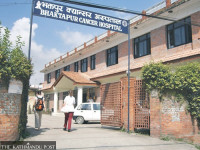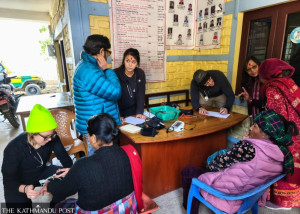Health
Ministry instructs agencies to prepare the health budget within previous ceiling
In the current fiscal year, 35 percent of national health budget was slashed. This hampered several healthcare programmes including maternal health, child health, family planning, and nutrition.
Post Report
The Ministry of Health and Population has directed the agencies concerned to prepare a budget for the next fiscal year within the ceiling of the current fiscal year.
Officials said they received directions to focus on making the existing health programmes effective instead of introducing new ones.
“Though we have not yet got the ceiling of the national budget, we have directed concerned agencies to start preparations within last year’s ceiling,” said Dr Roshan Pokhrel, secretary at the ministry. “It is not possible to introduce new programmes sticking to the ceiling of the health care budget for the current fiscal year.”
Some officials said they were told that they could raise the ceiling by 10 to 15 percent of the current fiscal budget, as fund cuts seriously impacted several priority programmes.
“It is not possible to start new programmes with a slight increase in the national budget,” said Lila Bikaram Thapa, chief of the nutrition section at the Family Welfare Division of the Department of Health Services. “We will instead focus on making the existing programme effective, which has maximum participation of the public.”
Officials say that the budget will be allocated to generate demands of health care services from the public, budget growth or progress monitoring,
The government presents the annual budget in Parliament on Jestha 15 every year (it falls on May 29 this year).
In the last fiscal year, the Ministry of Finance slashed the health budget by 35 to 42 percent, which hampered several healthcare programmes.
The government had also downsized the total budget by a substantial 13.59 percent to Rs243.83 billion for the fiscal year 2022-23, citing a plunge in revenue collection.
Officials said that a major cut in the national health care budget this fiscal year hit the country’s priority programmes, including those of maternal health, child health immunisation, nutrition, HIV, tuberculosis, epidemic control, control of non-communicable diseases, mental health, ayurveda and alternative medicines.
Health facilities also lacked funds to procure contraceptives such as condoms, pills, implants and emergency pills. Without sufficient budget, health authorities failed to expand verbal autopsy, a method of determining the cause of maternal death when no medical record or formal autopsy is available, in the current fiscal year. In Nepal, this method is being used to determine the causes of maternal deaths in 42 of the 77 districts.
According to officials, budget cuts for mosquito nets and testing kits have already affected the malaria elimination programme.
They say the plan was to procure 180,000 lasting insecticide-treated bed nets for the ongoing fiscal year, but only 120,000 pieces could be purchased. The Epidemiology and Disease Control Division had planned to buy 500,000 malaria testing rapid diagnostic kits this fiscal year, but it could purchase only 315,000 units.
Officials say that budget cuts will also affect the awareness drive, which is crucial to reducing the burden of diseases.
The total impact of the downsizing on the national health budget is unknown, but experts have warned that the government's decision to cut the budget has jeopardised achievements made in the health sector over the past several years.
“A lot of priority programmes have been affected by the budget cut,” said Dr Bibek Kumar Lal, director of the Family Welfare Division.




 10.12°C Kathmandu
10.12°C Kathmandu













